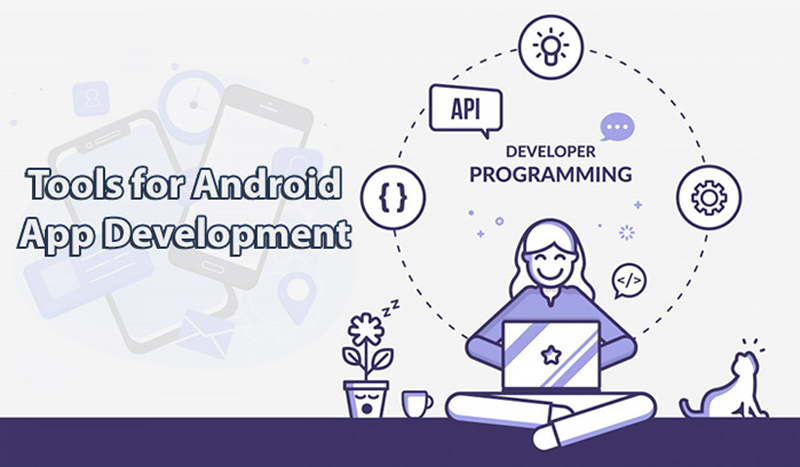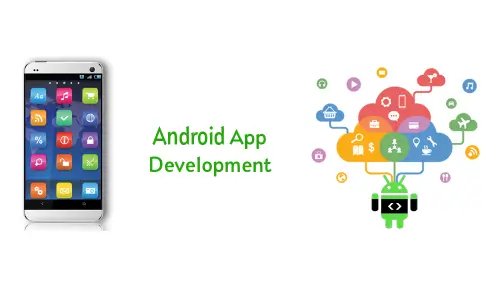Introduction:
Android has evolved over the years and quickly become the dominant mobile platform across the globe. Android holds over 74.13% of the global mobile OS market share as of December 2019.
Android mobile devices are immensely popular on the market today than any other operating system. So the demand for apps and experienced Android application developers are only going to continue to increase in the future.
What is Android?
Android is a mobile operating system based on a modified version of the Linux kernel and other open-source software, designed primarily for touchscreen mobile devices such as smartphones and tablets.
Android is an operating system designed with mobile in mind, the place where your phone’s functions and applications live. Everything you see on the display of your device is a part of the operating system. When you get a call, text message, or email, the OS processes that information and puts it in a readable format.
Here are the top 15 favorite tools currently being used for Android application development:
Android Application Development Tools:
1. Android Studio:
As the official integrated development environment for all Android applications, Android Studio always seems to top the list of preferred tools for developers.
Android Studio provides the fastest tools for building apps on every type of Android device.
Android Studio provides code editing, debugging, and testing tools all within an easy-to-use drag-and-drop interface. It is free to download and is supported not only by Google, but also by a large and actively engaged community of Android developers.
Features:
1. Instant app run
2. Visual layout editor
3. Fast emulator with intelligence code editor
4. Addition of new activity as a code template
5. Help to build up app for all devices
6. Help to connect with firebase
7. Support Kotlin and maven repository
2. ADB (Android Debug Bridge):
Android Studio includes the Android Debug Bridge, which is a command-line tool or “bridge” of communication between Android devices and other computers that can be used during development and the overall debugging and QA process.
By connecting an Android device to the development PC and entering a series of terminal commands, a developer can make modifications as needed to both devices.
3. AVD Manager:
An Android Virtual Device (AVD) is a configuration that defines the characteristics of an Android phone, tablet, Wear OS, Android TV, or Automotive OS device that you want to simulate in the Android Emulator. The AVD Manager is an interface you can launch from Android Studio that helps you create and manage AVDs.
4. Appcelerator:
Appcelerator Studio is an open extensible development environment for building, testing, and publishing native apps across mobile devices and OSs including iOS, Android. It allows developers to connect, model transform, and optimize data for both native or web app clients.
It allows developers to create apps with fewer lines of code. This app development tool supports iOS, Android, Windows, and browser-based HTML5 applications.
Features:
1. It improves the speed of mobile app development
2. Higher cloud capacity limits
3. This tool allows building mobile apps for all supported operating system
4. Virtual private or on-premises deployment
5. Built on open-standards and full access to the underlying mobile OS
6. Support for multi-region global deployments
5.Eclipse:
Eclipse is an integrated development environment (IDE) used in computer programming. It contains a base workspace and an extensible plug-in system for customizing the environment. The Eclipse software development kit (SDK), which includes the Java development tools, is meant for Java developers.
Even though Google no longer offers support for Eclipse, many developers still use it to create Android and other cross-platform apps, as it works very well with many different programming languages.
Features:
1. By default, all files are saved automatically after finishing typing.
2. Preview of your XML changes side by side, while making them. There’s no need to switch tabs like in Eclipse.
3. Smart autocompletion and generate commonly implemented activities
4. Typo checks with helpful VCS integration
5. Integrated command line in the IDE
6. Fabric:
Fabric is the development platform behind Twitter’s mobile application. It gives developers the ability to build better mobile apps by providing them with a suite of “kits” that they can pick and choose from. These kits include everything from beta-testing to marketing and advertising tools.
Google purchased Fabric from Twitter in January of 2017. Uber, Spotify, Square, Groupon, Yelp, and more big-name companies have utilized Fabric in developing their mobile applications.
Features:
1. It provides cloud service, so there isn’t any setup required
2. Data is stored as native JSON, so users can see what they stored
3. Data is safe because Firebase requires 2048-bit SSL encryption for all data transfers
4. File storage backed by Google Cloud Storage
5. Treat data as streams to build highly scalable applications
6. Data is reflected and backed up to multiple secure locations, so hardly any chances of data loss
7. It integrates nicely with frameworks like Angular JS. So it allows creating an app in a very short time
7. Genymotion:
Genymotion is a cross-platform development tool and supports many different programming languages and environments.
It helps developers test and preview an application on over 3,000 device scenarios. Genymotion is popular among gaming developers because it comes with pre-installed standard Android images and graphics that are quite useful in the testing process. It also provides greater speed than testing an app on an actual Android device.
Features:
1. Cloud-based Android virtual device to boost your test automation or run your app on your website
2. Run automated test
3. Enjoy a seamless ADB access
4. Enjoy smooth interactive access to your app
5. High streaming performances and low latency
8. Gradle:
In Android Studio, Gradle is used for building our android application projects, hence playing the role of a build system. Before Android Studio, in Eclipse we used to compile and build the applications using the command-line tool, which was soon taken over by GUI, based steps to build and run Android Applications in eclipse using ANT. Every android application development tool has to compile resources, java source code, external libraries, and combine them into a final APK.
Gradle is a build system, which is responsible for code compilation, testing, deployment, and conversion of the code into .dex files and hence running the app on the device.
Features:
1. Declarative builds and built-by-convention
2. Language for dependency-based programming
3. Supports different strategies to manage your dependencies.
4. Gradle is an open-source project and licensed under the Apache Software License (ASL).
5. Gradle Wrapper allows you to execute Gradle builds on machines where Gradle is not installed
6. Gradle fully supported for your ANT tasks, Maven and lvy repository infrastructure for publishing and retrieving dependencies.
9. IntelliJ IDEA:
IntelliJ IDEA is an integrated development environment (IDE) for any kind of Java applications, it automates and streamlines all steps of Android application development, from writing the source code to preparing your application for publishing.
Features:
1. Create the skeleton of a fully-functional Android application
2. Manage the project and add classes and resources, such as strings, layouts, graphics, etc.
3. Preview changes to the user interface through a tailor-made graphical designer
4. Write and debug your source code
5. Create unit tests
6. Package and run your application on both physical devices and emulators
10. Longrange:
LongRange is a native mobile app development tool. It comprises of components like navigation, tabs, form views and commands, and requires an installation of the LongRange serve.
It executes as a native app – very fast and with rock-solid reliability. It’s not a web app that runs on the server and it doesn’t rely on a web browser to deliver information to a mobile device.
Features:
1. It executes as a native app very fast and with rock-solid reliability
2. Build native mobile apps using only RPG/ CL with DDS
3. It provides the infrastructure for the application
4. Develop with only the current level of programming expertise
5. Develop without the need for any JavaScript, HTML, or CSS knowledge
6. Need to write once and deploy to Apple and Android mobile devices
7. Utilize mobile device features like GPS, camera, audio, SMS, etc.
8. Automatically push app updates into the mobile devices
9. Reduce the cost of maintaining and extending mobile apps
11. Mobincube:
Mobincube is the best tool to build native mobile apps for Android, iOS (Apple), and Windows Phone without programming. While generating the app, Mobincube will generate a mobile application that is compatible with each family of devices. • Push notifications to better communicate with clients.
Features:
1. Create mobile stores and helps to boost sales
2. Allows to Integrate 3rd party solutions within app
3. Helps to developed advanced functionalities
4. It allows updating online content
5. Customize every little detail in-app
6. Allows to communicate with users
12. RAD Studio:
RAD Studio is an integrated development environment that allows you to write, compile, package, and deploy cross-platform applications. It provides support for the full development lifecycle resulting in a single source codebase that can be recompiled and redeployed.
Features:
1. Secure native compilation
2. Code faster and smarter with a single code base
3. Code faster with full language support
4. Modern flexible libraries
5. ARC for mobile
13. Stetho:
Stetho is an Android debugging tool created by Facebook. It is a free open-source platform that allows access to a Chrome Developer Tools feature native to the desktop browser.
Stetho features a network inspection function for image preview, JSON response helpers, and exporting traces to the HAR format.
Features:
1. It can easily debug network cells
2. No need to add logs during development and remove them while releasing
3. Can see latency, size shot, fire sequence, request params, and response data
14. Visual Studio:
Visual Studio is Microsoft’s official integrated development environment and is a free tool for developers to use. It supports several different programming languages.
It can be utilized to create native Windows, Android, and iOS applications.
Features:
1. A code editor that supports syntax highlighting and code completion using IntelliSense for variables, functions, methods, loops, and LINQ
2. It includes a debugger that works both as a source-level debugger and as a machine-level debugger
3. In Visual Studio parlance, a solution is a set of code files and other resources that are used to build an application
15. Xamarin:
Xamarin is the preferred mobile app development tool for native applications. It reuses business logic layers and data access across platforms. It is widely used to build apps for iOS, Windows, and Android app development.
Features:
1. It is a mono framework which allows communication with the API of mobile devices
2. Xamarin Component Store includes UI controls, cross-platform libraries, and third-party libraries
3. It tends to produce fewer bugs and thus provides faster time to market
4. It allows application Indexing and Deep Linking
5.Platform-specifics allow to consuming functionality that’s only available on certain platforms
Summary:
There are hundreds of other useful tools such as these available for Android development. Each developer has their personal preference for what tools and environments they work with based on the particular application they are developing.
As the demand for Android applications continues to grow, the pool of platforms and solutions that help save developers time while helping to produce higher quality apps will continue to increase as well.
For more information or project requirements on android applications, drop an email to info@oditeksolutions.com.







